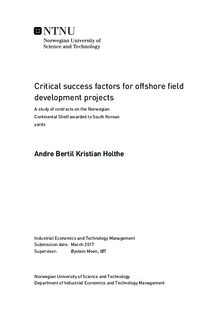Critical success factors for offshore field development projects - A study of contracts on the Norwegian Continental Shelf awarded to South Korean yards
Master thesis
Permanent lenke
http://hdl.handle.net/11250/2457362Utgivelsesdato
2017Metadata
Vis full innførselSamlinger
Sammendrag
This study examines Norwegian oil companies offshoring EPC-contracts on the Norwegian Continental Shelf to South Korean yards. Delays and cost overruns have stirred a public debate about this offshoring practice, yet researchers have paid little attention to what determines project success in this specific context. Through a multiple-case study design and interviews with senior project members, this thesis contributes to the understanding of factors that influence project implementation in South Korea. Three EPC-contracts are compared with one Fabrication Contract, thereby also allowing for comparative analysis of contract formats.
First, this thesis identifies 15 Critical Success Factors for the implementation of Norwegian offshore projects in South Korea. These factors are divided into categories corresponding to five essential implementation goals: mature engineering, yard priority, inter-firm co- ordination, tailored resource allocations and a strategic schedule.
Second, this study also reveals the underlying factors that cause project challenges. An exaggerated cost focus among both yards and operators, and organisations that were unfamiliar with each other lead to resource constraints and major coordination issues. Industry cycles also greatly influenced individual projects by determining yard capacity and cost trends. Contract format is seen to modify project execution, with Fabrication Contracts performing better than EPC- contracts. Lastly, an improvement in project execution over time is detected and this is attributed to organisational learning.
Implications of this study are that offshoring projects to South Korea require attention to specific factors during both project planning and execution. During planning, industry cycles should be taken into account as it greatly effects implementation and therefore decisions concerning contractor, contract format and contract timing. During execution, project organisations need to acknowledged and consider the characteristics of implementing projects in South Korea in order to achieve project success. For operators with South Korea experience, project implementation improves with each iteration, potentially developing into a competitive advantage.
